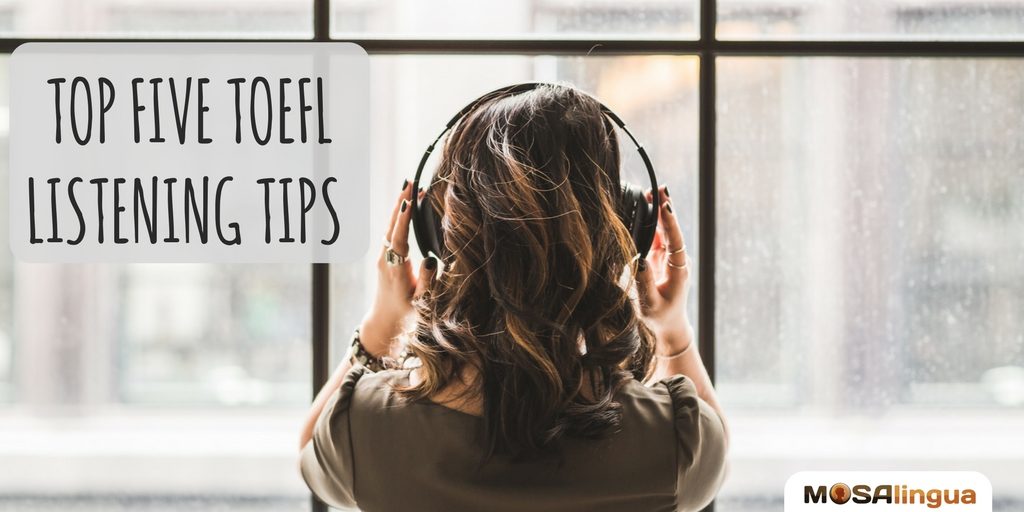Naturally, in order to get the best TOEFL score you can, it’s important that you follow the best strategies. This is as true on the listening section as it is on the others. Listening can be especially difficult because it’s not just a test of your English skills—it’s also a test of your TOEFL skills and your comfort with lectures. Remember that even native speakers sometimes have trouble answering questions on the TOEFL listening section. The tips below will help you become more comfortable with the TOEFL specifically, not just with general English listening.

1. Take Notes
Some TOEFL recordings are over five minutes long, with no pauses and a constant flow of new information. You will hear many thoughts and facts in those few minutes, and it can be extremely hard to remember everything you heard.
You’re not taking notes in order to write everything down, though. That’s impossible, because the speakers talk too fast. Instead, you are taking notes mostly just to keep focused. As a TOEFL teacher, I have taken the test many times. And there have been a few times when I got questions wrong in the listening section because I simply didn’t remember the part of the lecture a question was asking about. I’m a native speaker, but because I was distracted and stopped taking notes, I didn’t catch the important information. Always keep your pencil ready and think about the next thing to write.
2. Listen then Write
As I mentioned in the above tip, you can’t write everything down. You need to choose what you write. If you try to write down everything you hear, you won’t understand what’s said.
Instead, note-taking should be a two-step process. First, you listen to the person who is speaking. Then, you put the main idea down onto paper in your own words, as quickly as possible. The pause between listening and writing is very short—less than a second—but it’s important to consider the meaning of what you heard before you write anything.
3. Close Your Eyes
I don’t mean that you should close your eyes all the time; after all, how would you take notes with your eyes closed? Plus, there are pictures on the screen that can help you. Sometimes, you’ll see a diagram or picture that can clarify difficult information.
But if you become distracted, or if you have trouble staying focused on what the people are saying, it can be extremely helpful to just close your eyes and listen for a moment or two. Then, after you listen and understand a bit, you’ll want to open your eyes, write what you heard, and then close them again to re-focus.
4. Take Note of Opinions and Emotions
It’s not only the words we say that give information to the listener; it’s also how we say the words. That’s as true on the TOEFL as it is in the real world.
If you can identify a speaker’s feelings by the way they say something (and what they say), then you’ll be more able to answer questions about the general purpose of the lecture or conversations as well as any questions on speakers’ attitudes.
5. Pay Attention to Structural Words
Knowing many transition words can help with every section of the TOEFL, so I highly recommend studying them (as well as other academic vocabulary). When you hear a structural word like “however,” you know that the information which comes after relates closely to something that was just said. And you also know that the topic of both sentences (what they have in common) must be somewhat important, because the speaker is giving multiple details about that topic.
In the listening section, it’s very likely that you’ll hear whole sentences that show structure, too. Pay attention to any questions that you hear, for example. There will often be an answer to the question soon after, and that answer will often be a key part of the recording—something that should go in your notes.
*****
This post was written by Lucas Fink, resident TOEFL expert at Magoosh. For more advice on TOEFL prep, check out Magoosh’s TOEFL blog.
Related posts:
Want to start improving your language skills today?
Improve your English listening skills

Good news, we have a course for that! MosaSeries English: The Man With No Name. Start your 15-day free trial today and try it risk-free!
MosaSeries is an original and captivating English story divided into short episodes, designed to help you improve your listening skills, broaden your vocabulary, and learn the most important aspects of English grammar.







![MosaLingua Learning Languages During Sleep Study [VIDEO]](https://www.mosalingua.com/en/files/2016/09/1-768x384-2-300x150.jpg)
Comments